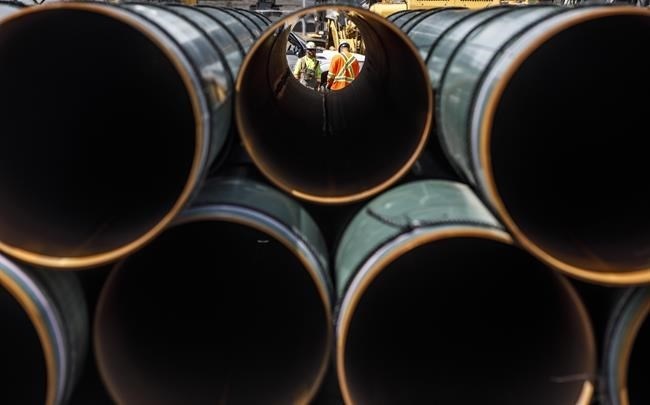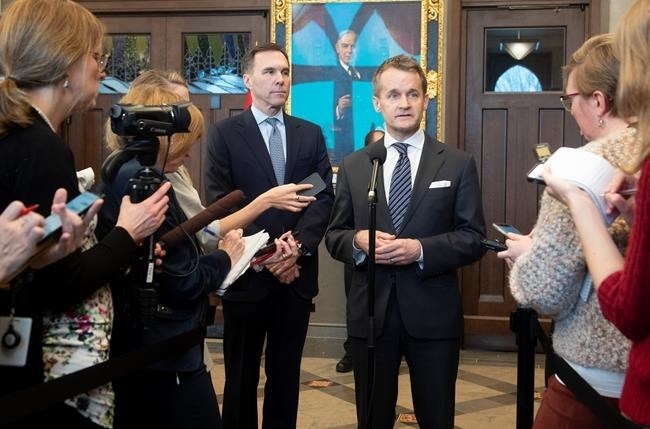
Pipe for the Trans Mountain pipeline is unloaded in Edson, Alta. on Tuesday June 18, 2019. The Federal Court of Appeal is set to release its decision on the latest challenge of the Trans Mountain pipeline expansion today.
Image Credit: THE CANADIAN PRESS/Jason Franson
February 04, 2020 - 10:40 AM
OTTAWA - The Federal Court of Appeal has dismissed the legal challenge to Ottawa's decision to approve the Trans Mountain pipeline expansion a second time.
In an unanimous, 3-0 decision, the court dismissed four challenges to the approval filed last summer by First Nations in British Columbia, saying in the 95-page decision that "we conclude that there is no basis for interfering" with the decision.
The decision paves the way for construction to continue on the project, though the First Nations have 60 days to appeal to the Supreme Court.
Cabinet originally approved the project, to twin the existing pipeline, in November 2016. Prime Minister Justin Trudeau said at the time it was in Canada's national interest to build the project, which will provide oilsands producers more room to get their products to market.

Minister of Finance Bill Morneau looks on as Natural Resources Minister Seamus O'Regan responds to a question from the media in Ottawa, Tuesday, February 4, 2020.
Image Credit: THE CANADIAN PRESS/Adrian Wyld
That approval was overturned by the Federal Court of Appeal in August 2018, citing an insufficient consultation process with Indigenous communities and a failure to properly take into account the potential impact on marine life from additional oil tankers off the B.C. coast. Ottawa then launched another round of consultations with Indigenous communities and asked the National Energy Board to look at marine life.
In June 2019, cabinet issued its second approval for the project. Following that, the Coldwater Indian Band, Squamish Nation, Tsleil-Waututh and a group of small First Nations in the Fraser Valley asked the court to review the decision a second time. In a December hearing, their lawyers argued the government went into the new consultations having predetermined the outcome.
In their 95-page decision, the judges said that was not true.
"Contrary to the what the applicants assert, this was anything but a rubber-stamping exercise," the decision says. "The end result was not a ratification of the earlier approval, but an approval with amended conditions flowing directly from the renewed consultations."
The judges say the government made a genuine effort, listened to and considered concerns raised by First Nations, and sometimes agreed to accommodate those concerns, "all very much consistent with the concepts of reconciliation and the honour of the Crown."
They also say while it is true not all the concerns raised were accommodated, "to insist on that happening is to impose a standard of perfect," that is not required by law.
The decision says the second round of consultations did not need to start from the beginning but rather address only some specific concerns raised by the court in its 2018 decision. Today's decision says the consultations the government held were sufficient to make their decision to approve the project reasonable.
The expansion project would triple the capacity of the existing pipeline between Edmonton and a shipping terminal in Burnaby, B.C., with the new pipeline carrying mainly diluted bitumen for export.
It has become a political football for Trudeau as he insists Canada can continue to expand oil production and still meet its commitments to cut greenhouse gas emissions.
Trudeau's government stepped up to buy the existing pipeline in 2018 after political opposition to the project from the B.C. government caused Kinder Morgan Canada to pull out from building the expansion. The government intends to finish the expansion and then sell both the existing pipeline and the expansion back to the private sector.
It has been in talks with some Indigenous communities about the sale but Finance Minister Bill Morneau has said the project won't be sold until all the risks about proceeding are eliminated. Those risks include this court case.
This report by The Canadian Press was first published Feb. 4, 2020.
News from © The Canadian Press, 2020